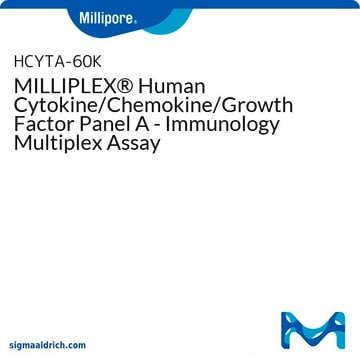HTMP2MAG-54K
MILLIPLEX® Human TIMP Magnetic Bead Panel 2 - Immunology Multiplex Assay
TIMP Bead-Based Multiplex Assays using the Luminex technology enables the simultaneous analysis of multiple TIMP biomarkers in human cell/tissue culture supernatant samples.
About This Item
Produits recommandés
Niveau de qualité
Espèces réactives
human
Fabricant/nom de marque
Milliplex®
assay range
accuracy: 77-95%
standard curve range: 10-10,000 pg/mL
(TIMP-4)
standard curve range: 20-20,000 pg/mL
(TIMP-1)
standard curve range: 49-50,000 pg/mL
(TIMP-2)
standard curve range: 98-100,000 pg/mL
(TIMP-3)
Technique(s)
multiplexing: suitable
Méthode de détection
fluorometric (Luminex xMAP)
Conditions d'expédition
wet ice
Description générale
The MILLIPLEX® Human TIMP Panel 2 Bead kit (TIMP-1, -2, -3, -4) has been designed for tissue/cell culture samples.
The Luminex® xMAP® platform uses a magnetic bead immunoassay format for ideal speed and sensitivity to quantitate multiple analytes simultaneously, dramatically improving productivity while conserving valuable sample volume.
Panel Type: Cytokines/Chemokines
Spécificité
No significant cross-reactivity was observed among analytes in this panel.
Application
- Analytes: TIMP-1, TIMP-2, TIMP-3, TIMP-4
- Recommended Sample type: Tissue and cell culture supernatants
- Assay Run Time: One day or overnight
- Research Category: Inflammation & Immunology
Caractéristiques et avantages
Stockage et stabilité
Autres remarques
Informations légales
Clause de non-responsabilité
Mention d'avertissement
Warning
Mentions de danger
Classification des risques
Acute Tox. 4 Dermal - Acute Tox. 4 Inhalation - Acute Tox. 4 Oral - Aquatic Chronic 2 - Eye Irrit. 2 - Skin Irrit. 2 - Skin Sens. 1 - STOT SE 3
Organes cibles
Respiratory system
Code de la classe de stockage
10 - Combustible liquids
Certificats d'analyse (COA)
Recherchez un Certificats d'analyse (COA) en saisissant le numéro de lot du produit. Les numéros de lot figurent sur l'étiquette du produit après les mots "Lot" ou "Batch".
Déjà en possession de ce produit ?
Retrouvez la documentation relative aux produits que vous avez récemment achetés dans la Bibliothèque de documents.
Notre équipe de scientifiques dispose d'une expérience dans tous les secteurs de la recherche, notamment en sciences de la vie, science des matériaux, synthèse chimique, chromatographie, analyse et dans de nombreux autres domaines..
Contacter notre Service technique










